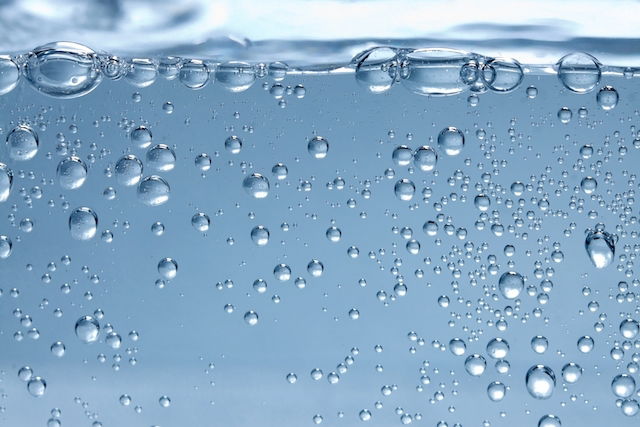Carbonated water is good for you, as it can hydrate you and contains the same micronutrients that still water can offer. The difference between the two is the addition of carbon dioxide (CO2), which is an inert gas that is eliminated by the body after ingestion. The presence of CO2 in the water gives it a bubble appearance and sensation, and provides the water with a more acidic taste.
Although it is generally healthy, some brands add other substances to their carbonated water, like flavoring agents and artificial sweeteners. These can reduce the drink’s possible health benefits, which is why you should read package labels closely.
Plain carbonated water, without additives, contains all the benefits of hydration and can promote increased water intake throughout the day, particularly in people who prefer soda due to their fizziness.

The main health benefits of carbonated water are:
1. Hydrates the body
Carbonated water hydrates and contains the same nutrients as still water. The addition of carbon dioxide is not bad for you, as the body will naturally absorb and eliminate this gas.
2. Rich in nutrients
Mineral water, with or without carbonation, is rich in nutrients like calcium, potassium and magnesium. Because it can also contain sodium, people with high blood pressure should carefully read drink labels, as some brands may have higher levels of this mineral that may be harmful to certain patient populations.
3. Promotes weight loss
The gas present in carbonated water is released in the stomach and can increase your sense of fullness. This can help to regulate your appetite and lead to decreased calorie intake during a meal. Plain carbonated water does not contain calories and can therefore be consumed freely.
4. Improves taste
Carbonated water can leave your taste buds more sensitive to certain foods and heighten your tasting ability. It may be an interesting drink option prior to a cup of coffee or a glass of wine.
The carbon dioxide in carbonated water also stimulates stomach functions. It can promote to increased mucus secretions and faster stomach emptying, which can help to improve your overall digestion.
5. Substitutes soda
Carbonated water is available with or without additional flavoring. Flavored carbonated water may be an excellent substitution for sodas. You can add lemon juice, orange juice, mint leaves or ginger, for example, to make carbonated water more tasty and appealing to drink throughout the day.
6. Improves swallowing abilities
Some studies show that carbonated water produces sensory and chemical triggers in the oral and pharyngeal mucosa which may improve swallowing. This may be a benefit for patients with dysphagia.
Is carbonated water harmful?
Carbonated water is fizzy like soda and can be just as flavorful, which is why there are many myths that liken carbonated water to soda. However, carbonated water without artificial flavoring does not pose any harm to your health.
As such, carbonated water:
- Is not harmful during pregnancy, and can be consumed during this phase of life. However, it is important to keep in mind that a pregnant belly can increase pressure in the stomach, making the stomach more sensitive or reactive to any food or drinks.
- Does not cause cellulite, as cellulite is associated with increased fat intake and sugary foods or drinks, and not carbonated water.
- Does not remove calcium from your bones, and does not interfere with calcium absorption from food. This can occur, however, with increased soda intake, as excessive soda drinking can lead to decreased intake of other fluids that contain important minerals. Sodas generally contain high amounts of caffeine and increase phosphoric acid action, which can decrease bone mineral density.
- Is not harmful for your kidneys, and can actually be beneficial, as increased intake will hydrate the body and optimize kidney function.
- Does not cause cavities or tooth breakdown, as the amount of acid in carbonated water is not very high. To be detrimental to your oral health, the carbonated water would need to be in direct contact with your teeth for many consecutive hours.
The daily recommended amount of water per day, with or without gas, is about 2 liters or 8 cups per day. This can vary from person to person depending on weight, activity level, sweat habits, and health history.
Who shouldn’t drink carbonated water?
Carbonated water is not recommended for children. Although it contains the same benefits as still water, it is best to promote the regular consumption of still water in children before introducing other drinks
Carbonated water should also be avoided by people with excess gas, dyspepsia or GERD, as the gas present in this water can increase gastric discomfort and malaise.
